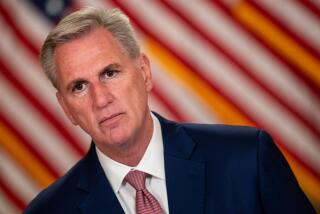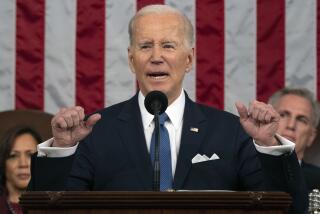Obama to seek budget cuts
CHICAGO — President-elect Barack Obama delivered a message Tuesday that even as the nation girds for a major stimulus package meant to “jolt” the economy out of its downturn, he will be a careful custodian of the budget, eliminating wasteful spending such as federal crop subsidies for millionaire farmers.
That type of federal outlay “is a prime example of the kind of waste that I intend to end as president,” Obama told reporters at a hotel in downtown Chicago, as he introduced Peter R. Orszag as his nominee to head the Office of Management and Budget. Orszag, educated at Princeton and the London School of Economics, headed the Congressional Budget Office, which analyzes budget issues.
But for Obama and Orszag to achieve any substantial savings, they will need to squarely confront the whopping chunk of the budget that got little attention in the news conference: massive entitlement programs covering Social Security and healthcare.
Budget experts applauded Obama’s plan to subject federal spending to rigorous scrutiny. The president-elect vowed to scour the budget for inefficiencies, using common-sense criteria for what should be preserved or discarded.
“We are going to go through our federal budget, as I promised during the campaign, page by page, line by line, eliminating those programs we don’t need and insisting that those that we do need operate in a sensible, cost-effective way,” Obama said.
Such a promise “is music to my ears -- an absolute symphony,” said Isabel Sawhill, a senior fellow at the Brookings Institution and an official in the Office of Management and Budget in the Clinton administration.
Yet for Obama to contain costs in a period of swelling deficits, he’ll need to make his review as expansive as possible, experts said. That means targeting not just scattershot discretionary programs, but the entitlement spending that accounts for about 54% of the $3-trillion federal budget. Curbing the cost of popular entitlements like Social Security is a risky political step. And Obama made no specific mention of Social Security or other such programs at his news conference.
“If we’re forecasting deficits of something in the neighborhood of a trillion dollars, and you think you can scrub the budget and find a trillion dollars, you can’t,” Sawhill said.
She said that Obama’s plan “needs to be done.”
“But I would add that you’ve also got to tackle the large entitlement programs such as Social Security, Medicare and Medicaid,” Sawhill said.
Maya MacGuineas, president of the Committee for a Responsible Federal Budget, an independent fiscal watchdog group, said: “The real money isn’t in scrubbing the budget for outdated programs. It’s so important to do that. It helps the credibility of the government. But the real money comes in very popular programs -- the entitlement programs.”
An Obama aide said later in the day that Obama’s review would encompass Social Security, Medicare and other popular programs.
Orszag, a student of healthcare who worked in the Clinton administration, has addressed these issues before.
In an essay that he co-wrote several years ago when he was at the Brookings Institution, Orszag called for restraining costs in the Medicare program. He advocated eliminating “excessive subsidies” to HMOs, labeling them “an unacceptable form of corporate welfare.” He also said that Medicare should use its purchasing power to drive down the cost of prescription drugs -- a step that powerful drug industry lobbyists may oppose.
In the same essay, the authors recommended raising Medicare premiums to address the program’s financial crunch, while shielding lower-income people and state governments from such premium hikes.
In calling for strict financial controls, Obama is attempting to reassure the public that government is still practicing budget discipline in times of massive deficit spending, budget analysts said.
The budget deficit reached $455 billion in the fiscal year that ended in September, and that figure could rise to $1 trillion in the current fiscal year. The stimulus package that Congress is considering exceeds $500 billion. At the same time, automakers are appealing to Washington for a multibillion-dollar bailout.
Obama said at the news conference that his victory Nov. 4 gave him a mandate “to move the country in a new direction and not continue the same old practices that have gotten us into the fix that we’re in.”
One test will be whether he leverages his sizable winning margin to make the entitlement programs solvent over the long term. Ignoring such spending is even more dangerous given that Obama rolled out expensive new programs during the campaign, some budget experts said.
G. William Hoagland, a former Senate Republican budget aide, said: “The area of attention here is primarily what we would refer to as the nondefense discretionary budget. That’s fine. But you’re not going to find the savings there in any way, shape or form to offset the expected increases in infrastructure spending, education and healthcare that he proposed in other places of the budget.”
--
More to Read
Get the L.A. Times Politics newsletter
Deeply reported insights into legislation, politics and policy from Sacramento, Washington and beyond. In your inbox three times per week.
You may occasionally receive promotional content from the Los Angeles Times.










